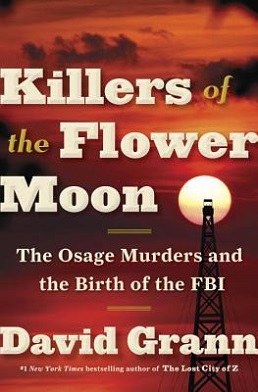What are you reading now?
-
Reread. (I'm rolling a warlock, so, why not. Seemed appropriate.)

-
@Aqua-Letifer What was that book you were mentioning on Police Brutality (and I don't mean White Fragility)
-
@LuFins-Dad Talking With Strangers by Malcolm Gladwell. It's sort of about that. I'd say it's more about the gaps in our thinking that lead to national news events (like police brutality, sexual assault on college campuses, etc.), and why those gaps exist in the first place.
Listening to the Audiobook is fun. It's much more like a podcast than a reading of the book itself.
-
@LuFins-Dad Talking With Strangers by Malcolm Gladwell. It's sort of about that. I'd say it's more about the gaps in our thinking that lead to national news events (like police brutality, sexual assault on college campuses, etc.), and why those gaps exist in the first place.
Listening to the Audiobook is fun. It's much more like a podcast than a reading of the book itself.
@Aqua-Letifer said in What are you reading now?:
@LuFins-Dad Talking With Strangers by Malcolm Gladwell.
I really enjoyed that book. I found the part about criminals and recidivism particularly disturbing.
-
@George-K said in What are you reading now?:
Finished Sinclair's "Lifespan" today. Most engaging and thought-provoking. He tends to get a bit preachy toward the end - I enjoyed the "science" parts more
Up next:

That was a fun read. As Aqua points out, it's substantially different from the TV series, but both hold up well.
I've enjoyed Ben MacIntyre's books ever since reading "Operation Mincemeat."
Up next:

" The celebrated author of Double Cross and Rogue Heroes returns with his greatest spy story yet, a thrilling Americans-era tale of Oleg Gordievsky, the Russian whose secret work helped hasten the end of the Cold War."
@George-K said in What are you reading now?:
I've enjoyed Ben MacIntyre's books ever since reading "Operation Mincemeat."
Up next:
" The celebrated author of Double Cross and Rogue Heroes returns with his greatest spy story yet, a thrilling Americans-era tale of Oleg Gordievsky, the Russian whose secret work helped hasten the end of the Cold War."
Finished it, and it was everything I was hoping for. This is a book that could have been some damn fine spy fiction novel. Totally engrossing, and it reveals the struggle to establish, maintain, protect, and finally exfiltrate the KGB colonel who fed information to MI6 for more than a decade.
I love Macintyre's books. This was just about as good as "Operation Mincemeat."
If you're looking for a great cold-war spy story, look no farther than this.
-

-
Finished the above book which I really enjoyed. I’ve always had a fantasy life of naval service especially interested in the smaller warships as opposed to the huge carriers. So if you are interested in day to day life on a destroyer, it’s a great book and I’d like to read his subsequent books on the geopolitics of the seven seas, and his latest on specific naval admirals.
And I’m also taken with George’s idea of rereading Dune, but I’m putting that on hold because I feel I should strike when the iron is hot and read Bolton’s book. I’m in no way a conservative, in fact I’m deeply liberal (sorry larry, still love ya) but I find brilliant conservatives ( ie George Will or William Buckley or Condi Rice)a pleasure to read because I feel challenged by their erudition and feel what a different world this would be if the Republicans would go back to their true roots rather than this absolute embarrassment of a president who has made me ashamed to be American born.
So the next book is the room where it happened.
-
actually I read this one a while ago, but the thread from Catseye reminded me of it, so I will post it here.
In the Kingdom of Ice

I thought it was a really really good book. Really into the atmosphere of the time. Amazing the challenges and trials that they went through.
From the notes:
In the late nineteenth century, people were obsessed by one of the last unmapped areas of the globe: the North Pole. No one knew what existed beyond the fortress of ice rimming the northern oceans, although theories abounded. The foremost cartographer in the world, a German named August Petermann, believed that warm currents sustained a verdant island at the top of the world. National glory would fall to whoever could plant his flag upon its shores.James Gordon Bennett, the eccentric and stupendously wealthy owner of the New York Herald, had recently captured the world’s attention by dispatching Stanley to Africa to find Dr. Livingstone. Now he was keen to re-create that sensation on an even more epic scale. So he funded an official U.S. naval expedition to reach the Pole, choosing as its captain a young officer named George Washington De Long, who had gained fame for a rescue operation off the coast of Greenland. De Long led a team of 32 men deep into uncharted Arctic waters, carrying the aspirations of a young country burning to become a world power. On July 8, 1879, the USS Jeannette set sail from San Francisco to cheering crowds in the grip of “Arctic Fever.”
The ship sailed into uncharted seas, but soon was trapped in pack ice. Two years into the harrowing voyage, the hull was breached. Amid the rush of water and the shrieks of breaking wooden boards, the crew abandoned the ship. Less than an hour later, the Jeannette sank to the bottom, and the men found themselves marooned a thousand miles north of Siberia with only the barest supplies. Thus began their long march across the endless ice—a frozen hell in the most lonesome corner of the world. Facing everything from snow blindness and polar bears to ferocious storms and frosty labyrinths, the expedition battled madness and starvation as they desperately strove for survival.
-
@George-K said in What are you reading now?:
Up next:

Good read. A bit mired in minutia at times, but it gives a great overview of the settling of the Ohio Valley, with an emphasis on Marietta. It spans the years from about 1790 to 1865.
To add to what @Jolly said here, apparently it was common knowledge among the settlers that Jefferson was taking "liberties" with those people he owned.
Up next:

The book investigates a series of murders of wealthy Osage people that took place in Osage County, Oklahoma in the early 1920s—after big oil deposits were discovered beneath their land.[6][7] After the Osage Native Americans are awarded rights in court to the profits made from oil deposits found on their land, the Osage people prepare for receiving the wealth to which they believe they are legally entitled from sales of their oil deposits.
However, a long and complex process of custodianship is imposed upon the distribution of the profits from the sales being made for very high profits and very few if any of the Osage people see any of this money. Still, they are the legal owners of the land and its profits, which is irksome to some of the administrators of the land who have a history of poor relations with the Osage people. Those elements hostile to the Osage people then decide that they could greatly simplify their profit mongering of the oil profits by eliminating those whom they consider to be operating as the "middle man" before they can abscond with the oil profits.
-
I know all you trumpets will hate me but I’m loving Bolton’s book. Halfway thru.
The reason is not that I’ve become a Bolton fan, he is quite fixated on his agenda.
But he writes so well. It’s such an easy book to read, I can hear him in my head narrating as we go along. He must have documented everything because he has details on almost every conversation and phone call.
anyway, he is not even being vindicative with the Donald. He just describes the disarray. The impulsiveness. The lack of ooordination.
So far the real tragic figure in the book is Kelly. He tried so hard to make some order. Bolton himself seems to have been resigned to getting the hatchet from the first day.
Anyway, strongly recommended to both right and left of the aisle here. It’s Illuminating and very readable. Not like the trashy book fire and fury. This one is much much better. And not trashy or gossipy at all. Very erudite.
Oh and p.s. absolutely no state secrets revealed. That was such an obvious ploy by trump to try to prevent publication. So don’t expect to hear who the mole in the kremlin is.
-
actually I read this one a while ago, but the thread from Catseye reminded me of it, so I will post it here.
In the Kingdom of Ice

I thought it was a really really good book. Really into the atmosphere of the time. Amazing the challenges and trials that they went through.
From the notes:
In the late nineteenth century, people were obsessed by one of the last unmapped areas of the globe: the North Pole. No one knew what existed beyond the fortress of ice rimming the northern oceans, although theories abounded. The foremost cartographer in the world, a German named August Petermann, believed that warm currents sustained a verdant island at the top of the world. National glory would fall to whoever could plant his flag upon its shores.James Gordon Bennett, the eccentric and stupendously wealthy owner of the New York Herald, had recently captured the world’s attention by dispatching Stanley to Africa to find Dr. Livingstone. Now he was keen to re-create that sensation on an even more epic scale. So he funded an official U.S. naval expedition to reach the Pole, choosing as its captain a young officer named George Washington De Long, who had gained fame for a rescue operation off the coast of Greenland. De Long led a team of 32 men deep into uncharted Arctic waters, carrying the aspirations of a young country burning to become a world power. On July 8, 1879, the USS Jeannette set sail from San Francisco to cheering crowds in the grip of “Arctic Fever.”
The ship sailed into uncharted seas, but soon was trapped in pack ice. Two years into the harrowing voyage, the hull was breached. Amid the rush of water and the shrieks of breaking wooden boards, the crew abandoned the ship. Less than an hour later, the Jeannette sank to the bottom, and the men found themselves marooned a thousand miles north of Siberia with only the barest supplies. Thus began their long march across the endless ice—a frozen hell in the most lonesome corner of the world. Facing everything from snow blindness and polar bears to ferocious storms and frosty labyrinths, the expedition battled madness and starvation as they desperately strove for survival.
@taiwan_girl I read In the Kingdom of Ice a couple months ago. Amazing read about something I had absolutely no knowledge of.
-
Right now I am reading Valiant Ambition: George Washington, Benedict Arnold, and the Fate of the American Revolution by Nathaniel Philbrick.


